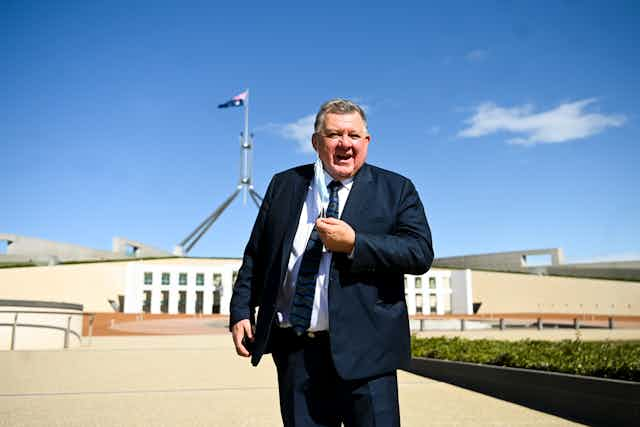The news that Craig Kelly, MP, serial purveyor of COVID misinformation, is to join Clive Palmer’s United Australia Party in order to fund his damaging ravings on a grander scale, confronts Australian democracy with a dilemma.
How is he to be prevented from adding to the harm he is already doing to the public welfare without trespassing unjustifiably on his right of free speech?
It is a classic example of how populists are exploiting the rights conferred by democracy to undermine democracy.
Kelly is frank about what he intends to do. Referring to his joining the UAP, he told The Sydney Morning Herald:
The crude reality is that I’ll have greater resources.
I have been screaming this stuff from the rooftops for a long time. It’s very hard to get this message through. We have a huge war chest, we can run television commercials, ads, we can finance a proper campaign that no other minor party or independent can.
He says that because these advertisements would be considered party-political advertisements, blocking them would be unconstitutional.
Whether or not he is right about that, it reveals his attitude: a preparedness to exploit a law protecting freedom of political speech so he can go on spreading COVID misinformation in pursuit of elected office.
The electoral and trade practices laws have no provisions to stop him. Section 329 of the Commonwealth Electoral Act is confined to the issue of whether a publication is likely to mislead or deceive an elector in relation to the casting of a vote. Sections 52 and 53 of the Trade Practices Act, which make false or misleading representations an offence, have nothing to say about political advertising.
Read more: Why Clive Palmer's lockdown ads can be rejected by newspapers on ethical grounds
However, there are two philosophical bases for arguing the electoral laws should be amended to thwart this kind of harmful exploitation.
One is John Stuart Mill’s harm principle, which says the prevention of harm to others is a legitimate constraint on individual freedom.
The other is from John Locke’s A Letter Concerning Toleration. Locke’s principle is that society is not obliged to tolerate actions or positions that undermine the civil order. Corrupting the electoral process as Kelly proposes – by misleading voters – falls well within that compass.
To borrow from Locke’s other great contribution to the development of modern democracy, his Second Treatise on Government, such actions or positions would breach the social contract. This contract is built on trust. Individuals submit themselves to the law on the condition that everyone else will do the same. Breaches of that trust are not to be tolerated.
This principle may be extended to other behaviours that breach the public trust: unethical conduct and anti-social conduct that might fall short of illegality but still do harm. Unethical conduct is embodied in Kelly’s stated intention to use Palmer’s millions to amplify his COVID misinformation, which would be to the detriment of public health.
In common with other mature democracies, Australia has predicated its laws on certain norms concerning truth, responsibility and the preservation of the social contract.
The problem is that in an age when populist politicians, social media and influential elements of mass media combine to spread harmful content, these norms – the guard rails of democracy – are being tested to breaking point.
In Washington on January 6 2021, when the mob invaded Congress, we saw what happens when the guard rails give way. For months leading up to and during the US presidential election, the then President Donald Trump and his mouthpiece, Fox News, abandoned the norm of truth-telling and persuaded a significant plurality of voters that the election was fraudulent.

This confronts democracies with a paradox. If they extend free speech even to those who use it to do serious harm, then tolerant societies become defenceless against the baneful effects of this behaviour.
It is akin to Karl Popper’s argument concerning what he called the tolerance paradox:
Unlimited tolerance must lead to the disappearance of tolerance. If we extend unlimited tolerance even to those who are intolerant, if we are not prepared to defend a tolerant society against the onslaught of the intolerant, then the tolerant will be destroyed, and tolerance with them.
In common with other democracies, Australia places restrictions on free speech when it does unjustified harm. The defamation and contempt of court laws are just two examples among many.
There is no reason why this principle should not be extended to speech that causes provable harm to the public welfare in pursuit of election to parliament. Those harms could be defined and circumscribed in the Electoral Act without too much difficulty and would certainly include harms to public health.
Read more: Right-wing shock jock stoush reveals the awful truth about COVID, politics and media ratings
There is precedent. In the aftermath of the Christchurch terrorism in March 2019, Parliament enacted the Criminal Code Amendment (Sharing of Abhorrent Violent Material) Act. Abhorrent violent material was confined in its definition to mean murder or attempted murder, a terrorist act, torture, rape or kidnapping. There are provisions to allow for the reporting of these acts.
At the same time, great care needs to be taken to avoid overreach, particularly in a society like Australia’s, which has no constitutional protection for free speech. That situation only sharpens the paradox.
As matters stand, Australia is leaving it to powerful foreign sources such as YouTube, unelected and unaccountable, to restrain the likes of Kelly, as when it recently suspended Sky News for spreading COVID misinformation.
Instead of confronting the paradox, the Australian parliament seems content to outsource to the global media platforms control over how our democratic freedoms are governed. Neither of the major parties has shown the slightest interest in engaging with this problem.

